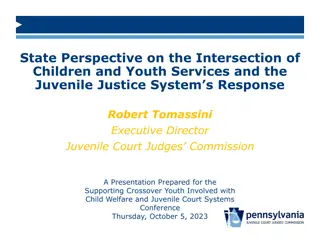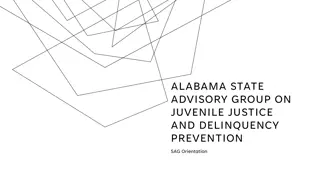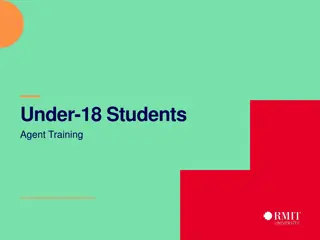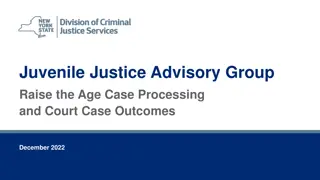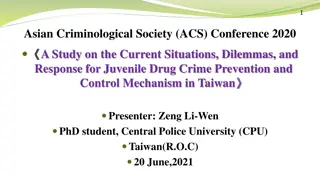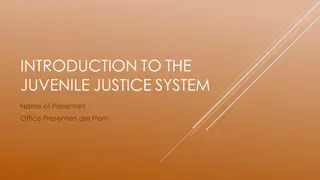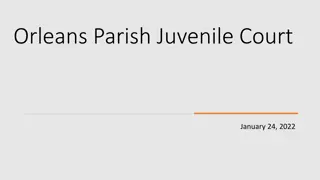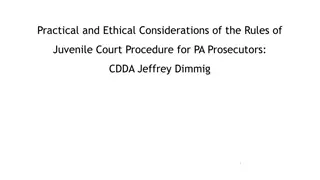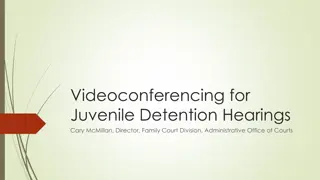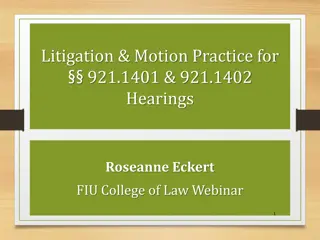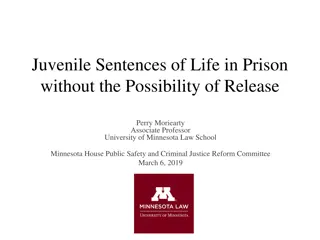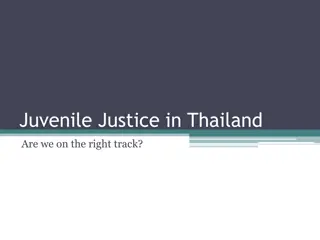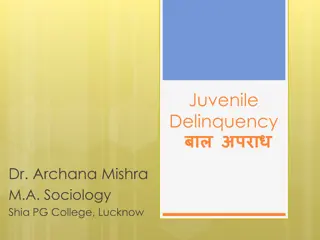Promoting Juvenile Welfare and Community Protection
This legal document aims to ensure the care, protection, and holistic development of children while safeguarding the community and preventing unlawful behavior by minors. It outlines the roles of various court officials, prosecutors, and the process for handling juvenile and adult cases.
Download Presentation

Please find below an Image/Link to download the presentation.
The content on the website is provided AS IS for your information and personal use only. It may not be sold, licensed, or shared on other websites without obtaining consent from the author.If you encounter any issues during the download, it is possible that the publisher has removed the file from their server.
You are allowed to download the files provided on this website for personal or commercial use, subject to the condition that they are used lawfully. All files are the property of their respective owners.
The content on the website is provided AS IS for your information and personal use only. It may not be sold, licensed, or shared on other websites without obtaining consent from the author.
E N D
Presentation Transcript
This title shall be construed to effectuate the following public purposes: to provide for the care, the protection, and the wholesome moral, mental, and physical development of children coming within its provisions and to protect the welfare of the community and to control the commission of unlawful acts by children.
Juvenile Court #1 Referee Richard Ainsa 65thDistrict Court Judge Yahara Lisa Gutierrez Juvenile Court #2 Referee Maria Teresa Leyva-Ligon
Ralph Girvin Juvenile Unit Chief Courthouse Prosecutors/ Criminal Unit: Mark Burtner Michael Gomez Patsy Lopez JPD Prosecutors: Amy Monsivais Linda Perez Jose Castillo
Trial Delinq./Not Delinq. (Guilty/Not Guilty) Voir Dire (Voir Dire) Disposition (Punishment)
Adult (17 yrs +) 1. Defendant 2. State = D.A. 3. Bond Hearing 4. Indictment 5. Guilty/Not Guilty 6. Conviction 7. Punishment 8. Revocation 9. Beyond Reasonable Doubt Juvenile (10yrs-16yrs) 1. Juvenile 2. State = C.A. 3. Detention Hearing 4. Petition 5. Delinquent/Not Del. 6. Adjudication 7. Disposition 8. Modification 9. Beyond Reasonable Doubt
Judge must release the juvenile, unless Prior adjudication Danger to self Danger to community Likely to abscond/be removed from the jurisdiction No suitable supervision NOTE: Cannot pay to be released!
Law Enforcement Agency Juvenile Probation Department Deferred Prosecution Program (DPP)(some misdemeanor cases) El Paso County Attorney s Office Decline/DPP Case Petition as Indeterminate Request Certification as a Adult Determinate
Certification Up to TYC until the age of 19 3rd Degree Felony: up to 10 years 2ndDegree Felony: up to 20 years 1stDegree Felony: up to 40 years Same punishment as an adult By Petition Determinate Sentence
Charge only (like federal court) Punishment determine d later Negotiation ! Three choices for juvenile Set case for motion hearing Set case for jury/non- jury trial Stipulate (Adjudica tion)
Either by judge or jury Juvenile may elect either; State does not need to agree Just like an adult trial Beyond a reasonable doubt Criminal rules of evidence Number of jurors Except No guilty or not guilty & number of misdemeanor peremptory strikes Adjudicated committed a delinquent act or did not commit a delinquent act Jury Trials
Pre Home study Disposition Report (PDR) Adversarial
Judge can only sentence a juvenile if the protection of the public OR the child requires that a disposition be made. the child is in need of rehabilitation OR
Judge can only remove a juvenile from his home if The child, in the child s home, cannot be provided the quality of care and level of support and supervision that the child needs to meet the conditions of probation.
Indeterminate Misdemeanor Felony Determinate Family Code 53.045 Certification/Transfer to Criminal Court Family Code 54.02
IN-HOME OUT-OF-HOME Curfew (usually 5pm) Treatment facility No curfew Independent Living Skills Electronic Monitor RTC Drug Court/Special Needs Challenge Intensive Supervised Probation/Serious Habitual Offender Comprehensive Action Program (SHOCAP) Texas Juvenile Justice Division (TJJD)
54.05, Hearing to Modify Disposition Can modify if child is still under 18 and violated Can remove child from his home if It is in the child s best interest, and Reasonable efforts were made to prevent/eliminate the need to remove the child, and The child, in the child s home, cannot be provided the quality of care and level of support/supervision that child needs to meet the conditions of probation
Completion of Sex Offender Treatment (SOT) Request the Court Defer Registration until SOT is completed by juvenile (CCP Sec. 62.352) Upon Successful Completion juvenile is exempt from registration unless the prosecutor requests a hearing & the Court finds interest of the public requires registration. (CCP Sec. 62.352)
New Jersey v. T.L.O., 469 U.S. 325 (1985) Juveniles have a lesser expectation of privacy at school NOTE: This only applies to school officials (not officers) who conduct searches! SRO s are considered to be police officers
Facts Juvenile is less culpable than an adult because Lack maturity More likely to succumb to outsides pressure(s) Character not fully formed Holding NO execution for those under 18 years of age because of the 8th Amendment
From the Juvenile System To Success





